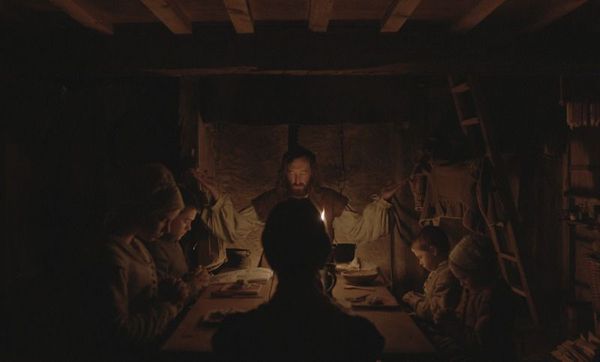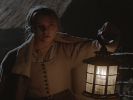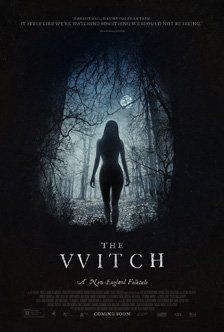Eye For Film >> Movies >> The Witch (2015) Film Review
The Witch
Reviewed by: Owen Van Spall

Though Robert Eggers' impressive debut - which he wrote and directed - shows its hand pretty early on that something supernatural really is out there in the woods, much of the intrigue and tension in The Witch comes from the well-drawn, and very earthbound internal conflicts within one settler family. Surely the only thing more frightening than an evil spirit is seeing your family members turn against you, and to feel that your own faith has lost its protective shield? The setting and subject matter suggest the infamous Salem Witch trials of the 1690s, but Eggers sets his story decades before those events, in an isolated, gloomy part of the New World where the European colonists are already in a battle to survive the elements even before this new unnatural menace starts tearing at their sanity and faith.
Eggers' certainly knows how to find the right locations and use the tools of cinematography and skill of cinematographer Jarin Blaschke, to create an atmosphere of unrelenting bleakness. For most of the running time, save a brief opening section where we see them banished from their plantation by the ruling council for the father’s excessive devoutness, we are alone with a pious Christian family on a remote and humble farm situated on the edge of a dense forest. Eggers drains his film’s colour pallette, so the sun never seems to shine through onto the toiling people below. A coat of mud covers everything, this land is sticky and boggy. He often shoots the forest trees, in close-ups with the cast and with the wider shots, so they are towering above the people, overwhelming them. Humans are insignificant here, and the strange enemy that starts to torment these people might be seen as symbolic of the power of the land to resist these interlopers. The father’s corn crops seem to wither away no matter what. The family are starving.

With the elements already taking their toll, the family are thrown into greater despair when their youngest child inexplicably goes missing, in a creepy “peek-a-boo” scene that lets your eye’s ability to be distracted by peripheral motion do most of the work. Some flashes of mysterious, magical evil are shown to us at various points, often in obscure close ups shrouded in gloom. But the film's real grip lies in the display of how tensions and paranoia breed within the family; all witchcraft has done is reveal the hypocrisy and doubt what was festering there all along. Maybe the witch is feeding off this, or was created by it.
Stoic father William (Ralph Ineson), for example, has sold a precious cup that belonged to his wife Kate (Kate Dickie) and cannot bring himself to confess even when the mother accuses her children of stealing it. Another sin of his, pride, refuses to allow them to this hard land and thus admit defeat by crawling back cap in hand to the plantation. His very patriarchal position is undermined with every rotten ear of corn they drag in. Kate, the increasingly harried mother, finally breaks and reveals her faith is shaken to the core, and, riven wih guilt over bringing her children here, longs to return home to England. Tomasin (Anya Taylor-Joy), the eldest daughter, is under suspicion from the start as it was in her care that the baby, Sam, was taken. Caleb ( Harvey Scrimshaw), the eldest son, finds his thoughts preoccupied by budding sexual desire and the guilt that follows it like a shadow, especially as it is his sister that his infant lust is directed at. And the petty conflicts and bullying between Tomasin and the spooky younger twins (one of the film’s weak points, spooky children are an overused tool) threaten to escalate into accusations of witchcraft at the drop of a hat.
The path of the family’s breakdown is refreshingly unpredictable. William seems early on to be exactly the kind of stern, fanatically devout patriarch who will not hesitate to put his children to the sword when the scent of witchcraft catches him. But instead of becoming the film’s equivalent of The Shining’s Jack Torrance, he turns out to be a far more deeply conflicted and self-critical man, not without redemption. Much is left uncertain elsewhere. When Tomasin and the twins hurl accusations of sorcery at each other, is it just childish play taken too far in the heat of the moment, or something more? The family are constantly menaced by the animal life around them, “Black William” their goat runs wild and a rabbit with an intense stare is frequently seen at the edge of the wood, always startling the horses when it appears from nowhere.
Eggers effectively builds the terror up gradually until it eventually supplants the bleakness and leads everything spinning into a tornado of hysteria, punctuating the flow sparingly with the odd jolt of fright, and the occasional glimpse of something more explicitly arcane. Mark Korven's eerie, discordant score ensures things are always on edge. Though much is left unexplained by the delirious final sequence, the characters remain relatable, all too human in their fears and flaws. There are fine performances from all involved, with the cast admirably handling the antiquated olde english, which adds to the surreal, fable-like atmosphere.
Reviewed on: 18 Oct 2015


















